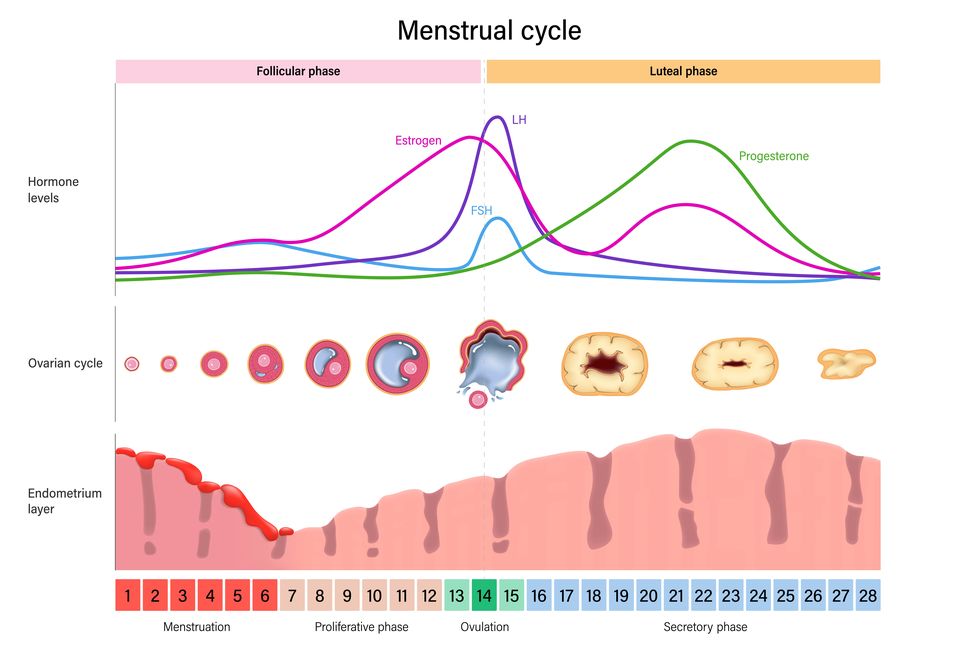I used to hate getting my period. The week prior was a PMS-nightmare: honking horns or silverware colliding in a closed drawer made me boil over with rage; an old man eating breakfast alone created a pitiful cocktail of coffee and tears. This luteal misery only ended with the comforting validation of an unstoppable current of blood, which confirmed I wasn’t crazy for cursing cars and spoons and death, but brought its own miseries. The shedding of my endometrium (uterine lining) and blood was a nuisance, a mess to be contained, and its accompanying sluggishness something to overcome. I am lucky not to suffer from serious bloating, cramping, or migraines (as I know many period-having women experience), and I imagine these symptoms add another layer to the universal disdain women have for their periods.
While the disdain for having a period may be the result of the aforementioned experiences and symptoms – mood swings, physical pain, reduced energy, the hassle of maintenance and clean-up – I have come to learn that much of my menstrual hatred has been carefully ingrained by the patriarchy. There are many ways the patriarchy has used menstruation to oppress and control women: men weaponize menstruation to label women as crazy and emotionally unstable, menstruation is stigmatized as unpleasant or disgusting / something to be concealed (like hiding a tampon in your sleeve before going to the bathroom), haphazard education and research surround menstruation, the cost of menstrual hygiene products disproportionately burdens (low-income, homeless, incarcerated) women, societal conditions and expectations accommodate men’s hormonal cycles (24 hours) without considering women’s hormonal cycles (28 days).
When I was a junior in high school, I was suspended for three days for throwing an unused tampon at my friend Amanda. It sounds as stupid as it was. It was theology and we had a substitute teacher, so naturally we were fucking around. Some kid (16-year old) in my class was so disturbed by the sight of a tampon flying across the room that he sulked into the weight room after school and was asked to explain his distress to a (male) football coach, who then filed a sexual harassment complaint with the school. I was kicked out of the National Honor Society, the California Scholarship Federation, and was not technically allowed to be team captain of the Varsity basketball team (though my rebellious spirit wouldn’t let that hard-earned title slip away). I was suspended from school for three days and threatened with expulsion as they investigated the legitimacy of this claim as sexual harassment. I don’t want to undermine my classmate’s experience, but I do think this story is emblematic of how poor education and strategic stigmatization around periods are weaponized to oppress and control women, often unconsciously.
There’s so much to say about periods, about being a woman, and about everything about girl/womanhood being stigmatized. I remember when Justin Bieber and One Direction became THE thing in the early 2010s and all the boys made fun of them and their fans. I’m sure their hatred stemmed partially from jealousy, but certainly the Biebs and Harry Styles were labelled ‘girly’ and consequently received vitriol and ridicule from our male peers. Nowadays, this animosity of ‘girly things’ extends to astrology, Taylor Swift, pink, ‘like’, periods, and more.
For so long, internalized misogyny has encouraged girls to stand apart from other girls, to be ‘different,’ to generate respect by rejecting ‘girly’ things (see Kendall Jenner being a tomboy for 3 minutes straight). While I recognize that periods can sometimes inherently suck because of the pain, acne, sluggishness, and mess they create, I also believe that much of our menstrual disdain is intentionally indoctrinated and representative of misogyny’s still-powerful rein.
What if we could embrace the cyclical nature that menstruation represents? By learning more about our cycle, we can learn to navigate and honor each of its phases and requirements. Social media has helped forward this message by promoting content like seed cycling and exercising according to your cycle. I’ve also found this guideline from Allison Clark helpful and personally accurate:
- Menstrual phase (1-5)
- Archetype: wise woman
- Season: winter
- Mental/emotional/physical state: quiet, slow, sensitive, introspective, reflective, healing
- What’s happening: low hormone levels, slight boost in follicle-stimulating hormone (FSH)
- Follicular (6-16)
- Archetype: goddess
- Season: spring
- Mental/emotional/physical state: focused, creative, active, social, playful, driven, independent
- What’s happening: drop in FSH, rise in estrogen (E)
- Ovulatory (17-22)
- Archetype: mother
- Season: summer
- Mental/emotional/physical state: loving, nurturing, sensual, communicative, caring
- What’s happening: rise in luteinizing hormone (LH) and FSH = egg release, drop in E, rise in progesterone (PG)
- Luteal (23-29)
- Archetype: enchantress, wild woman
- Season: fall
- Mental/emotional/physical state: introspective, edgy, instinctual, intuitive, restless, anxious, agitated, critical
- What’s happening: drop in LH & FSH, rise in PG & E to prepare for pregnancy, no pregnancy? drop in PG & E
So here is a call to embrace your period and the inherent femininity of it: to walk to the bathroom with your tampon held triumphantly in hand for the world to see; to investigate what your fluctuating hormones are revealing to you – new perspectives and hidden truths, invitations for rest and reflection. Connect with your cycle and honor your womanhood, which links you to the seasons, to the moon, and to nature. Your sensitivity to pain, injustice, and grief is not an accident or ailment, something to suppress or overcome. Your period is a gift, a superpower!! *Sticks fingers inside vagina and smears blood across face like warrior paint, worst-person-in-the-world style*

Leave a Reply